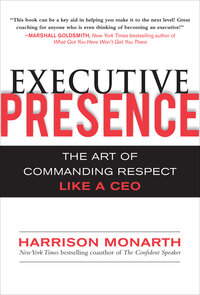Harrison Monarth, Executive Presence: The Art of Commanding Respect Like a CEO. McGraw-Hill, 2009.
Related Volume: Monarth, 360 Degrees of Influence
Referenced in:
LifeandLeadership.com Summary
One may legitimately wonder why I would include this as a resource for ministers. The focus of this book is image projection and reputation management. For good reason, most understandings of pastoral influence focus on inward character, not external image. Both the teachings of Jesus (Matt. 6:1; 23:25-28) and the Apostle Paul (2 Cor. 4:2-3; 1 Tim. 4:12, 16) emphasize this. Scripture runs directly counter to what is found in popular literature on the subject. One may become so concerned with image as to ignore development as an authentic human being from the inside out. It is said, “The path to external impressiveness and internal emptiness is the same road.” Also, “Pay little attention to the applause of the crowd or the acclaim of the critics, but live for the approval of the Conductor.” I could not agree more.
On the other hand, most pastoral influence is not the hard currency of positional authority, but the softer currencies that are tied to how one is perceived. One may possess the integrity of character and conviction, and the weight of competence, yet project an ineffective persona that diminishes social capital. A leader must behave publicly in a way that commands respect and gains and maintains trust. Some call this “presenting the best version of yourself.” This is intentional work. This text, though written with business executives, not ministers, in mind, still provides wisdom for church leaders.
Monarth discusses the natural laws of perception, how the people around you perceive you. He says that today, this happens in three ways:
1. Influencing people and events through success in communication – Developing your social intelligence, reading people and predicting behavior, engineering buy-in nad gaining compliance, mastering the art of storytelling, changing behaviors and attitudes, managing interpersonal conflict and improving relationships, and holding difficult conversations.
2. Self-branding – Understanding what your personal brand says about you, using the internet to expand one’s personal and professional brand, and managing media to enhance reputation and raise professional profile.
3. Reputation management – Protecting one’s good name and web reputation.
You will notice, however, that most of Harrison’s focus is on communication competence. For this reason, I have categorized this in Leadership Development Through Communication Competence. Also, since developing these skills can increase one’s influence in situations where one lacks official leverage, I have also included it in Leadership in Subordinate Roles.
Publisher’s Description
An expert in coaching high-level players in the art of perception management, Harrison Monarth reveals the critical difference between CEOs and those of us who wish to be CEOs. It’s not a matter of intelligence, connections, or luck. It can be summed up in two words: executive presence.
While most of us toil in obscurity and expect great things to follow, those on the path to corporate leadership spend their time perfecting the types of leadership communication skills that generate respect and get others to share their vision. They use these skills to establish how they are perceived by others and to manage their reputation throughout the organization. In other words, these soon-tobe top players have developed the presence of an executive through careful image management—and they make sure they have the goods to back it up.
In Executive Presence, Monarth shows how you can seize control of your own career using the same skills. Inside, he explains how to:
- Accurately “read” people and predict their behavior
- Influence the perceptions of others
- Persuade those of opposing views to your side
- Create and maintain a personal “brand”
- Manage and control your online reputation
- Perform damage control when things go wrong
Monarth’s conclusions aren’t based solely on his keen insight and extensive experience; they’re the result of the latest scientifi c research in interpersonal communication and human behavior.
Talent and skills are important, but they alone won’t take you to the top of your organization. People reach highly infl uential positions because they deeply understand the power of perception and know how to leverage it in their favor. The good news is, anyone with the will to succeed can do it. Executive Presence provides all the techniques you need to take your career to the highest level of any organization.
About the Author
Harrison Monarth is the founder and president of GuruMaker, a global communications consulting firm that helps Fortune 500 executives, international politicians, and other high-level professionals shape events using the skills of persuasion, image management, and media leveraging. He is the coauthor of the New York Times bestseller The Confident Speaker.
**For additional information on this resource, including reviews, click the bookstore links. Check the reference at page top or the links below for resource guides on related topics.***
Related Ministry Resources
See Other Resources on Leadership Development:
See Other Ministry Resources on Leadership:
See Resources on Over 100 Areas of Christian Ministry:


